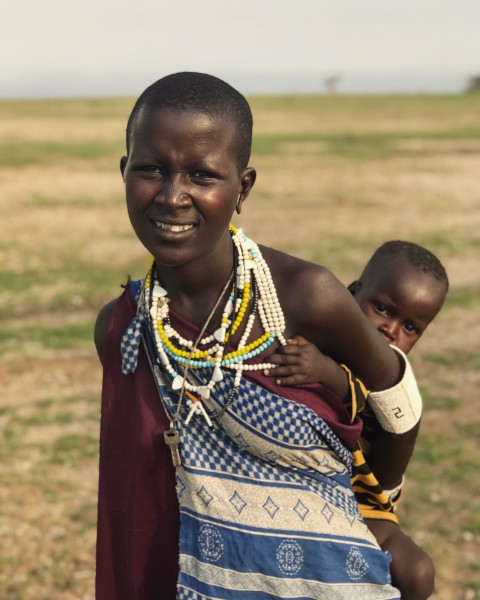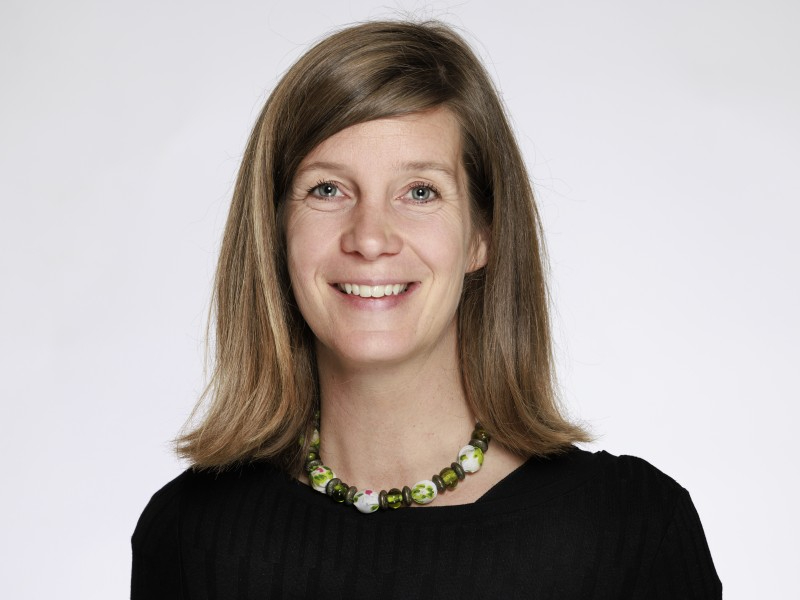Share post now
Article
« How can property own property? »
22.06.2021, International cooperation
Between 2016 and 2019, I had the opportunity to take part in the WOLTS project, an action-oriented research project on mining, pastoralism, and women’s land rights in two Maasai villages in the Arusha and Manyara regions of northern Tanzania.

© Tobias Peier
Mundarara, a little village with less than 5000 inhabitants, is nestled in green hills, accessible only by a long, bumpy dirt road, passing giraffes, antelopes and ostriches, Maasai men in flowing red robes, in one hand a stick to herd the cows, in the other a cell phone. We also see ornately-dressed women balancing firewood on their heads while other women are digging through rubble on the tailings of a ruby mine, looking for small gemstones to sell.
On my first visit to Mundarara, our team is met by the village leader, a tall, portly middle-aged man. In his office, a small mud house with a few broken chairs, a table and some yellowed papers on the wall, he greets us with a handshake and a twinkle in his eye. After explaining our mission, we ask him and the other village elders present a few initial questions about mining and land rights in the village. When I ask if women are allowed to own land, one of them responds indignantly, "How can a property own a property?"
This sentence was commonly heard during our research and succinctly summarizes the situation of many Maasai women: women and girls are considered the property of men - first of their father, and then, after marriage, their husband. Women’s ownership of anything (cattle, houses or land) is out of the question.
The Maasai are considered one of the most patriarchal tribes in Africa . Both female genital mutilation and child marriage are still widespread practices, despite legal prohibitions. The stories of many of the women we talk to are similar: hardly any of them have finished elementary school, their working days are long and filled with hard work (fetching water and firewood, milking cows, etc.). The money they earn by selling jewellery, firewood or, more recently, waste products from the mines is often barely enough to survive, especially since many men do not adequately provide for their families.
Hard work starts with marriage
One group discussion I took part in with a group of second wives was particularly memorable. I expected a group of older women, but instead we were greeted by 3 girls, between 14 and 16 years old, two of them heavily pregnant. The girls tell us that they are happy to be second wives because:
"…We feel sorry for those women who don’t have co-wives because they have even more work to do…Heavy responsibility starts with marriage. When you are at home you can tell your mother you are tired and she will tell you to go and rest. When you are married all the power is with your husband and you dare not even tell him that you are tired, otherwise you will be beaten…” (cited in Daley, E., et al (2018). Gender, Land and Mining in Pastoralist Tanzania, p.43).
Violence is also part of many women's daily lives. In many ways, mining has exacerbated this violence, as outsiders now come to the villages to search for gems. In both villages we heard again and again of rapes and even murders that go unpunished. Many women feel abandoned by their husbands and not infrequently women themselves are blamed for having been raped.
Gender roles are changing
As bad as these stories are, we also hear positive stories, stories of change. These come to the fore, especially later in our work. Based on community feedback on our initial research, we offered a structured training programme over the following year. The individual training sessions consisted of information on land rights, mining legislation and gender equality, as well as interactive discussions and role-plays on these topics.
Initially, women sit in one corner, men in the other. Women hardly ever speak, and if they do dare to say something, they are rebuked by the men in the room. Only when we divide the groups by gender do they start talking. I am often asked by the men about my situation. Do I make all the decisions in my house? These discussions are interesting, because not everything is perfect in Switzerland either: I tell them how women were not allowed to vote until 50 years ago, how they needed permission from their husbands to work and how it is still difficult today to reconcile work and family. Sexism and violence are furthermore still part of everyday life for many women here.
In the discussions, we realize that gender roles are changing among the Maasai. While many older people got married through so-called “bookings” (a man gives a pregnant woman a ring, thus booking the unborn child - if it is a girl – for marriage), many younger Maasai talk about an increase in "love marriages". These marriages often remain monogamous and are characterized by much greater cooperation between the couples. The division of labour is also changing due to mining, climate change, and other factors - women are increasingly performing "traditionally" male tasks, like herding cows, but without relinquishing the "traditionally" female tasks, like fetching water and firewood. Here, too, there are parallels with Switzerland, where women are increasingly entering "traditional" male domains both in the professional as well as in the political field, but still often earn much less than men and continue to perform a large part of unpaid care work.
Even the village leaders want to participate
In the training sessions, we discuss concrete examples to show up the difference between "sex" - the male or female body we are born in and "gender" - the roles and tasks a woman or man should perform or the specific attributes considered feminine or masculine. While our body is given to us by birth, gender roles vary from culture to culture and they also change over time. The point of the WOLTS training programme is not to change Maasai culture, or to impose our Western culture, but to show that gender roles and relations are changing – among the Maasai, as well as in the West - and that it is up to all of us to shape and contribute to that change. As one male participant aptly noted, "We can still be Maasai and carry on our traditions, but some traditions are harmful, we have to change them" (quoted from unpublished WOLTS team data).
The findings of the project are now emerging and it is clear that it has had an impact. It certainly provoked discussion and many women felt empowered just by knowing that they have rights and that gender roles are not natural but can change. Even the village leader, who at the beginning had asked: "How can a property own a property", asked if he could be part of the next round of training.
For more information
The Women’s Land Tenure Security Project (WOLTS) started in Tanzania and in Mongolia. For more information see: Mokoro . The full Tanzania research paper (Daley, E. et al (2018). Gender, Land and Mining in Pastoralist Tanzania) can be found here. This article is based on my personal impressions and experience, but draws heavily on WOLTS research findings and all quotes are cited with permission of the project.
